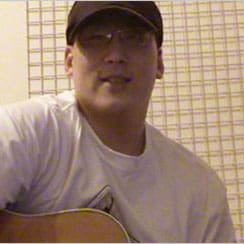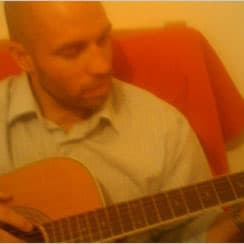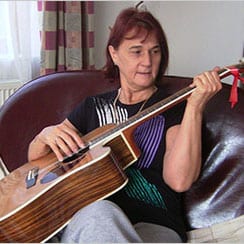College is weird. You show up somewhere new and you're supposed to just make friends somehow. Like, okay, but how?
Being an introvert, I was never good at opening up like some are naturally. Nor am I to this day, kicking middle age...
But here's something that worked for me: guitar. Not in a show-off way. Just having one around and knowing how to play a bit opens doors you wouldn't expect.
Why Does Guitar Work as a Social Tool?
There's actual science behind this. Music creates social bonds through shared rhythms and synchronized activity. When people make music together, their brains release endorphins and they experience something researchers call "self-other merging".
Basically your brain starts feeling connected to the people you're playing with, we're literally wired to connect through music.
Here's what makes guitar specifically good for this:
- It's portable - you can bring it to dorms, parties, outdoor hangouts
- People recognize songs - play something familiar and people join in
- Low barrier to entry - you don't need to be amazing for it to work socially, just a few chords and strumming patterns does the job for most acoustic songs
- It's not intimidating - unlike a full drum kit or classical violin
- Acoustic guitars need no setup - no amps, no electricity, just grab and play
I met some of my closest college friends because I had a guitar.
Here are the 4 best ways you can use your guitar chops to get some social cred as well.
1. Group Learning
A lot of people learn guitar alone as a hobby. That's fine.
But college is actually the perfect time to learn with other people.
Studies on peer learning in music found that collaborative learning among peers benefits your sense of belonging, motivation, and self-efficacy. Nearly half of music students (48.4%) reported that discussing practicing with peers was beneficial to a large or very large degree. Another 43.2% said it was beneficial to some degree.
This means meeting and befrending more and more people.
Here's what I'd suggest trying:
- Take a group class - Many colleges offer group guitar classes for non-music majors. Everyone's learning together. No pressure. Automatic friend group.
- Form a casual practice group - Not a band necessarily. Just 2-3 people who get together once a week to work on stuff together. You learn faster and it's way more fun.
- Join or start an open mic night - Even if you just go to watch at first. You'll meet other people who play and the vibe is usually super supportive. But only play if you're advanced at the guitar. Strumming a few chords in your dorm room with others is not like an open mic night.
Sometimes you get invited to an open mic night or jam session but you've got a 10-page essay due in two days. If you're completely swamped and there's a chance to connect with other musicians, you might want to use Papersowl or a similar service to get your essay written, so you don't miss out on social opportunities that only happen once. College friendships built around music don't wait for convenient timing.
The point of all this is that when everyone's learning together, you form bonds faster than in a library or sitting in the park.
Finding Your Music People
College has a ton of musical subcultures. You just have to find them.
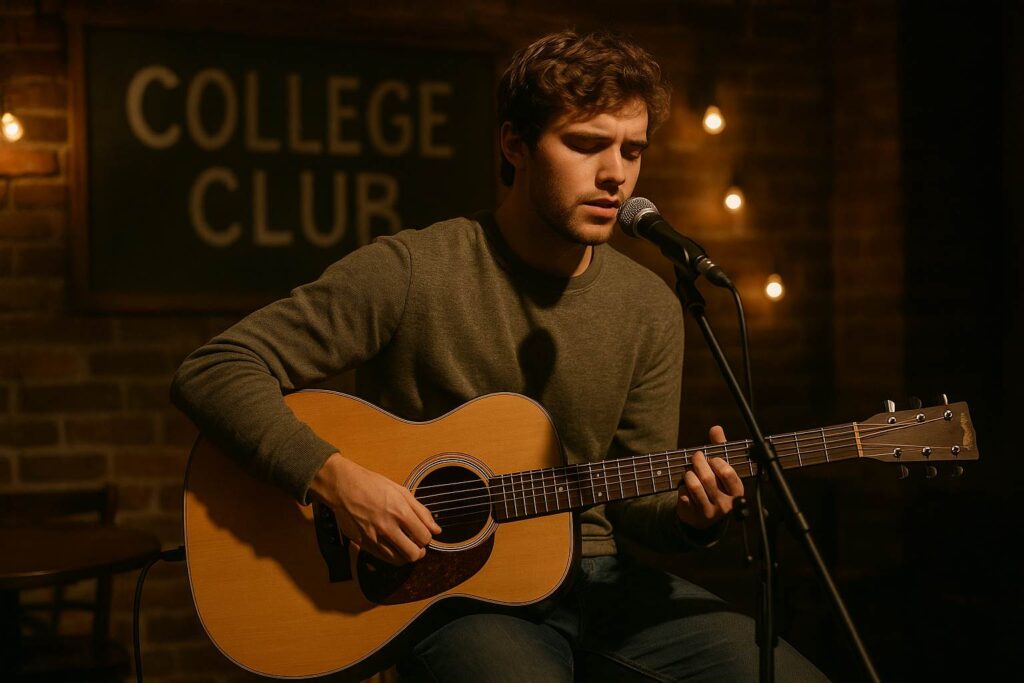
Music clubs and organizations - Most schools have these. Jazz club, songwriting club, classical guitar ensemble, whatever. Show up. Even if you're not amazing yet. Nobody cares about skill level as much as you think they do.
Practice rooms - If your school has a music building with practice rooms, hang out there. You'll hear other people playing. Sometimes doors are open. Conversations happen naturally.
Open mics and coffee shops - Check what's happening near campus. Open mics are full of people looking for musician friends. Everyone's nervous. Everyone's supportive. It's a whole vibe.
Online campus groups - Facebook groups, Discord servers, whatever your school uses. Post "anyone want to jam?" and see what happens. I'd suggest being specific about your skill level so people know what to expect.
Research shows that 36.36% of college students accessed music 3-5 times in the past week specifically for social or emotional purposes. A quarter of students did it more than 10 times. Music is a huge part of college social life already. Guitar just gives you a more active role in it.
2. The Dorm Room Effect
Research on college students and music shows that social cohesion is higher when young people engage with music together. This effect works even in cultures where independence is valued over interdependence.
To demonstrate the effect, here's an interesting thing my guitar player nephew told me. His roommate freshman year didn't play any instruments, but he told my nephew later that having a guitar in their room made people more likely to stop by and hang out. He likened it to a social signal that their room was a chill place.
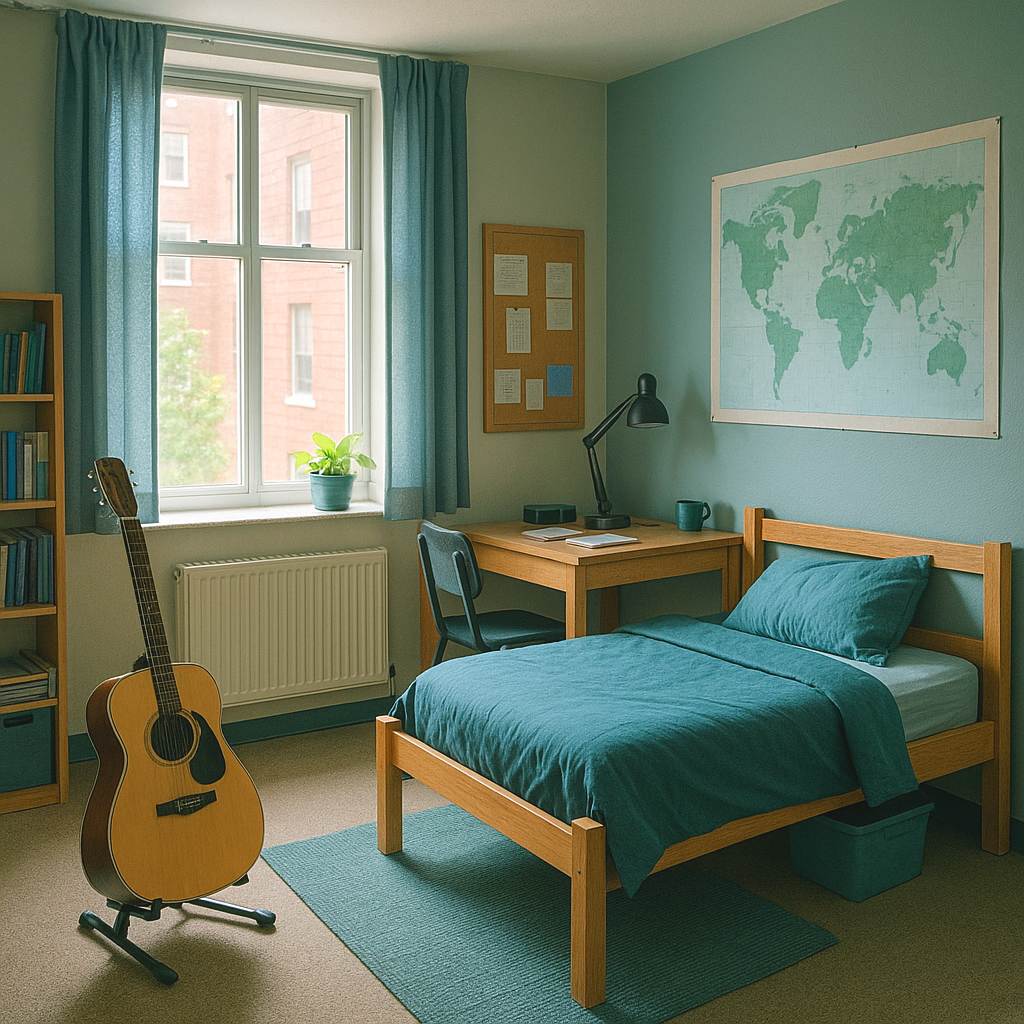
I'd recommend keeping your guitar visible in your dorm:
- On a stand, not in a case
- Near where people can spot it in your room
- Maybe with a few simple songbooks nearby
- In a spot where you can grab it easily
People see it and ask about it.
- "Oh you play guitar?" becomes a conversation starter.
- Then maybe you play something.
- Then maybe they mention they used to play piano or drums or whatever.
- Suddenly you're talking about music and sharing Spotify playlists and making plans to hang out or jam sometime.
3. The Common Area Strategy
This is where I made the most friends through guitar back in my college days. Find where people hang out in your dorm or college campus. Bring your guitar. Play casually.
You're not performing. You're not trying to impress anyone. You're just sitting there playing songs you like. Maybe singing a bit if you feel like it.
What happens:
- People walking by stop to listen
- Some people sit down nearby
- Eventually someone smiles and requests a song
- Someone else mentions they play bass or drums
- Phone numbers get exchanged
- Plans get made
Music increases contact, coordination, and cooperation with others. It gives people more extroverted than you and me an easy reason to approach you. "Hey can you play [whatever song]?" is way easier than walking up to a stranger and trying to start a conversation about nothing.
The shared memories from making music together just hit different than regular hangout memories. You create something together. Even if it was just a sloppy cover of "Seven Nation Army" at 2am in a dorm hallway.
4. Parties and Social Gatherings
Guitar at parties is tricky. Done wrong it's super annoying. Done right it's actually fun for everyone.
| Do's | Don'ts |
|---|---|
| Play when people ask | Play when everyone's dancing on the dancefloor |
| Know crowd-pleaser songs (Wonderwall, Sweet Caroline, or other easy guitar songs to sing along with) | Play complex instrumental pieces no one knows |
| Let other people sing along | Hog the guitar the entire night |
| Keep it brief (5-10 minutes max) | Turn it into a concert |
| Pass the guitar around if others play | Get upset if people want your music to stop |
The key is reading the room. Sometimes the vibe is right for acoustic guitar stuff. Sometimes it's not.
I'd recommend paying attention to what people actually want rather than forcing it. Popular songs people can sing along with, fast paced ones are great. Stay clear of your own compositions and slow songs that they wouldn't even know.
And when it works? It's amazing. Everyone's singing together. The energy shifts from "we're all at the same party" to "we're all doing something together." And you're at the center.
The "I'm Not Good Enough Yet" Problem
This is the thing that stops most people, expecially shy introverts like me, but know one thing.
Nobody cares as much as you think.
And that's generally true in all areas of your life.
If you can play 4 chords and change between them without pauses while people sing, you can play socially. That's it. That's the bar.
Some of my best social guitar moments were when I was still pretty terrible:
- Playing "Horse With No Name" (literally two chords) at a bonfire
- Playing Ring of Fire on my guitar at the same bonfire, 3 chords 😉
- Teaching the E minor arpeggio from Nothing Else Matters
- Figuring out a song by ear with two other people, none of us quite getting it right
The point isn't perfection. The point is shared experience. Research on music and social bonding shows that making music together increases oxytocin levels. That's the bonding hormone. It makes you feel closer to the people you're with. This happens whether you're playing perfectly or not.
I'd recommend thinking of guitar as a social activity that happens to involve an instrument, not as a performance you need to perfect before sharing.
Practical Advice To Starting From Zero Socially
Maybe you're shy (like I was), and maybe you're not naturally outgoing (like me).
I get it. I was super nervous the first time I played in front of people who weren't my immediate family or my dog.
Here's what might help:
Start really small - Play for one friend in your dorm room. That's it. Just one person. Get comfortable with that before you level up.
Have a few songs ready - I'd suggest knowing 15-20 songs well enough that they are enjoyable. Simple ones that people recognize. This gives you confidence and a repertoire large enough to have something for most people.
Team up with another musician - Playing with someone else takes pressure off you individually. You're sharing the attention. Plus it sounds better.
Remember everyone's focused on their own stuff - People are way less judgmental than you think. They're mostly just happy someone's playing music.
Use it as background - You don't have to announce "I'M PLAYING GUITAR NOW EVERYONE WATCH." Just start playing quietly while people are hanging out. Natural and low-pressure.
The Real Benefits
I'm not going to tell you guitar is magic that automatically gives you a huge friend group and make you the most popular guy/gal on campus.
But here's what can truly do:
- Gives you a reason to approach people or for them to approach you
- Creates shared experiences that bond you to others
- Gets others to enjoy their time with you way more than if it was just small talk
- Provides conversation topics beyond small talk
- Connects you to musical communities on campus
- Makes you memorable in a good way (not "that guy who plays Wonderwall too much" but more like "oh yeah the person with the guitar")
College can be lonely. Especially first year when you don't know anyone yet. Having a social tool like guitar just makes the whole process easier.

